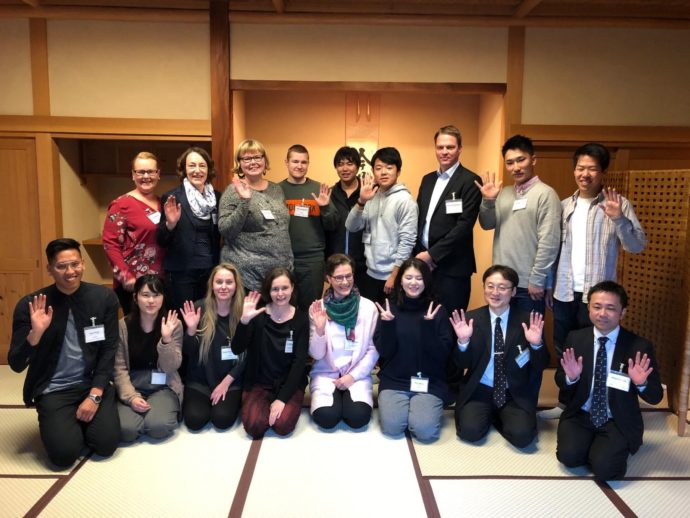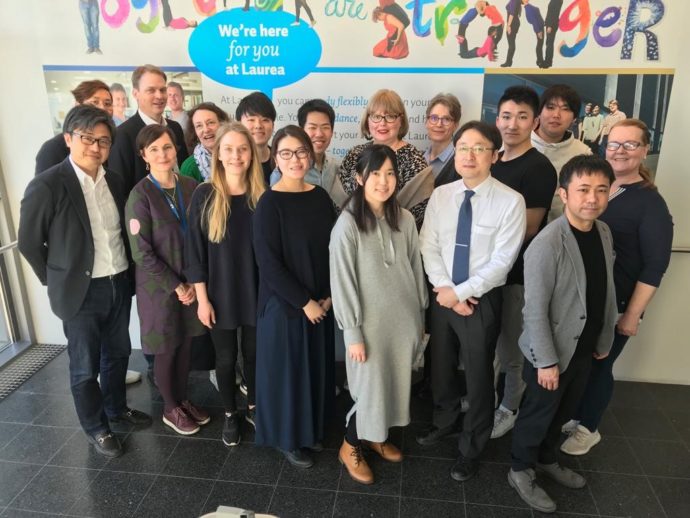FInJap-project is a joint project of Laurea University of Applied Sciences, Häme University of Applied Sciences and Tohoku Fukushi University, which started in August 2018. It is a two-year project, in which the students of the project team can learn together about elderly care services and the welfare of the elderly. Project team is multi-professional and consists of three lecturers and six students from both Finland and Japan. The first year of FinJap-project has now come to an end. In this article social service-student Henni Tuominen tells about the project and Japanese partners’ visit to Finland.
Finnish project team visiting Japan
During autumn semester 2018, the students of the FinJap-project from Finland and Japan examined social and health care services in their own countries as well as social structures behind them. Both teams studied the subject through different points of view and gathered all the knowledge in presentations, that would later on be shared and compared with each other.
In October Finnish project team travelled to Sendai, Japan, where the team got to know the everyday life of Japanese elderly people, such as day center activities and living in public and private care homes. In addition to elderly care services, Finnish project team got to experience Japanese culture, habits and cuisine. The visit was truly amazing and the knowledge we got of the elderly care in Japan, was wide.
Project continued in January 2019 when Finnish and Japanese students started to work together to deepen the understanding of the services and structures in the field of elderly care. We Finnish students had another task as well – to plan a program for a visit week as the Japanese partners were coming to Finland in April. What kind of week could we organize to make sure the Japanese visitors had an as unforgettable experience as we did in Japan? What services could we show, to give them an over-all picture of Finnish elderly care services?
 Picture 1: Project organization in Tohoku Fukushi University
Picture 1: Project organization in Tohoku Fukushi University
Both Japan and Finland have the same kind of situation regarding ageing society. Post-war baby boom generation is growing older and retiring, and elderly care services must develop at the same time with increasing needs. Both countries provide public and private care, but more and more elderly people are also depending on care given by a relative or another close one. Traditionally in Japan, the first-born child with his or her spouse is responsible for taking care of the parents. In Finland, home care takes care for the majority of those in need of help, when also informal care has a bigger and more important role in the field of care than we even might think of. In addition to recognizing that we have elderly people in need of help and care, we should remember that Finland also has a large amount of healthy and energetic elderly people whose need of support for inclusion and well-being is equally important.
Japanese project partners’ visiting Finland
During spring semester, the program of the visit week varied and evolved before it reached its final shape. We wanted to find different services and service units, that would give a realistic picture and new information of Finnish elderly care to the Japanese project partners.
To show the everyday life of Finnish elderly people living in care homes, we chose to take the whole project team to visit public care home Ilveskoti in Hämeenlinna and private care home Villa Fredrika in Hyvinkää. These facilities offered the team to have a peek at the daily routine, activities and the living environment of the elderly.
To show the function of third sector, we visited in an NGO center Onnensilta in Hyvinkää, where we got the opportunity to interview and talk with elderly people and to take part in a group singing activity. The visit to Onnensilta showed us the importance of a place, where people can come to spend their time and socialize with others.
In addition to these visits, we got professionals from service counseling, home care and informal care to lecture at campus. A versatile overview of the services offered to the elderly expanded our understanding of how large the field and the needs for different services in elderly care are.
Besides project working, the visit week consisted of tasting Finnish food, playing national sport baseball and having an experience of Finnish cottage life. During the week it became clearer of how own kind Finnish culture is; the ordinary food Finns eat and habits they have were completely different and new for the Japanese.
A very special activity was a trip to a cottage at lake Herunen. The Japanese project partners got to experience steaming hot sauna and even had the courage to dip into the icy lake – courage, that many Finn even lack of. In its own way the trip to the cottage helped to create the picture of what it’s like to be Finnish and what things one might end up missing when the ability to function starts to hinder a certain lifestyle. By hosting the Japanese, we Finnish students also got to see our home country and culture in a different light. Things we take for granted cause amazement and admiration in the others.
 Picture 2: Project organization in Laurea
Picture 2: Project organization in Laurea
Planning and organizing the visit week from start to finish, and especially being a part of FinJap-project has been an educating and unforgettable experience. The project has increased the understanding and widened the picture we beforehand had of elderly people and the services provided for them. Even though the media nowadays paints a slightly negatively tinted picture of Finnish elderly care, it was great to get to show how elderly care works in Finland. There is a lot of good in Finnish elderly care, and when the structures are well organized, there is potential for development.
FinJap-project will continue through Autumn 2019 and spring 2020 with new students. I am looking forward to finding out what the next project team will start to work on and hearing the results when the project comes to its end.